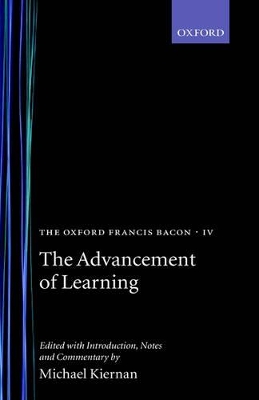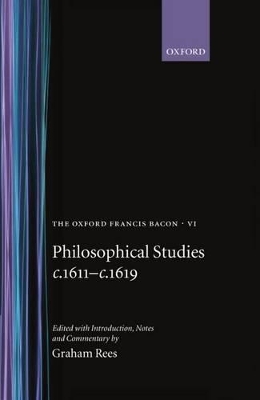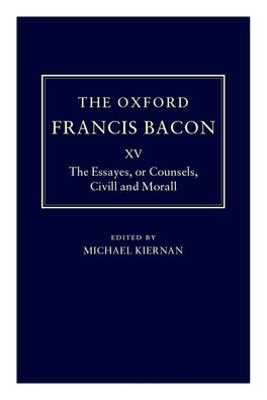The Oxford Francis Bacon
4 primary works
IV
This is the first critical edition since the nineteenth century of Bacon's principal philosophical work in English, The Twoo Bookes of Francis Bacon. Of the proficience and advancement of Learning, divine and humane - traditionally known as The Advancement of Learning.
VI
This volume inaugurates a new critical edition of the writings of the great English philosopher and sage Francis Bacon (1561-1626) - the first such complete edition for more than a hundred years. It contains six of Bacon's Latin scientific works, each accompanied by entirely new facing-page translations which, together with the extensive introduction and commentaries, offer fresh insights into one of the great minds of the early seventeenth century.
XIII
This volume belongs to the first new critical edition of the works of Francis Bacon (1561-1626) to have been produced since the nineteenth century. The edition presents the works in broadly chronological order and according to the best principles of modern textual scholarship. The seven works in the present volume belong to the final completed stages (Parts III-V) of Bacon's hugely ambitious six-part sequence of philosophical works, collectively entitled
Instauratio magna (1620-6). All are presented in the original Latin with new facing-page translations. Three of the seven texts (substantial works in two cases, and all sharing a startlingly improbable textual history) are published and translated here for the first time: these are an early version of the
Historia densi, the 'lost' Abecedarium, and the Historia de animato & inanimato. Another - the Prodromi sive anticipationes philosophiae secundae - has likewise never been translated before. Together with their commentaries and the introduction they open the way to important new understandings of Bacon's mature philosophical thought.
Instauratio magna (1620-6). All are presented in the original Latin with new facing-page translations. Three of the seven texts (substantial works in two cases, and all sharing a startlingly improbable textual history) are published and translated here for the first time: these are an early version of the
Historia densi, the 'lost' Abecedarium, and the Historia de animato & inanimato. Another - the Prodromi sive anticipationes philosophiae secundae - has likewise never been translated before. Together with their commentaries and the introduction they open the way to important new understandings of Bacon's mature philosophical thought.
XV
Bacon's essays reflect the experience and wide reading of a Renaissance man - philosopher, historian, judge, politician, adviser to the Prince - above all, astute observer of human nature. With uncompromising candour, he exposes man as he is, not as he ought to be, examining such givens of Renaissance power as negotiating for position, expediting a personal suit, speaking effectively, and the role of dissimulation in social and political situations. He scrutinizes
judicial prerogatives and probes the causes and dangers of atheism and superstition. Even such topics as boldness or love or deformity have a practical bent. In Bacon's own phrase, these essays 'come home to Mens Businesse and Bosomes.' It is especially through their matchless style that they come
home-with imaginative vigour, concrete language, and the colloquial force of individual sentences. An introduction places the essays in their original context, examines their evolution over Bacon's lifetime, and elucidates their form and prose style; a commentary examines his sources and relates essays to his other writings; a glossary and index are also included.
judicial prerogatives and probes the causes and dangers of atheism and superstition. Even such topics as boldness or love or deformity have a practical bent. In Bacon's own phrase, these essays 'come home to Mens Businesse and Bosomes.' It is especially through their matchless style that they come
home-with imaginative vigour, concrete language, and the colloquial force of individual sentences. An introduction places the essays in their original context, examines their evolution over Bacon's lifetime, and elucidates their form and prose style; a commentary examines his sources and relates essays to his other writings; a glossary and index are also included.



